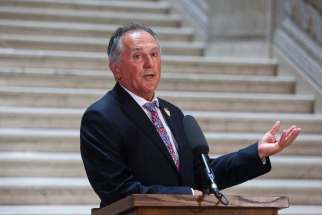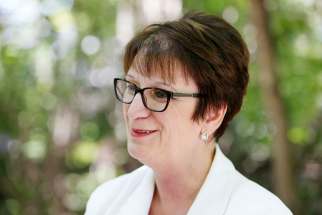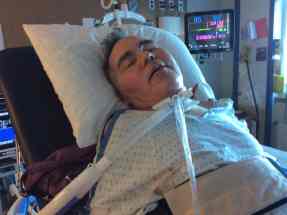Jewish community opposed to medical college’s proposed circumcision changes
Read this article for free:
or
Already have an account? Log in here »
To continue reading, please subscribe:
Monthly Digital Subscription
$0 for the first 4 weeks*
- Enjoy unlimited reading on winnipegfreepress.com
- Read the E-Edition, our digital replica newspaper
- Access News Break, our award-winning app
- Play interactive puzzles
*No charge for 4 weeks then price increases to the regular rate of $19.00 plus GST every four weeks. Offer available to new and qualified returning subscribers only. Cancel any time.
Monthly Digital Subscription
$4.75/week*
- Enjoy unlimited reading on winnipegfreepress.com
- Read the E-Edition, our digital replica newspaper
- Access News Break, our award-winning app
- Play interactive puzzles
*Billed as $19 plus GST every four weeks. Cancel any time.
To continue reading, please subscribe:
Add Free Press access to your Brandon Sun subscription for only an additional
$1 for the first 4 weeks*
*Your next subscription payment will increase by $1.00 and you will be charged $16.99 plus GST for four weeks. After four weeks, your payment will increase to $23.99 plus GST every four weeks.
Read unlimited articles for free today:
or
Already have an account? Log in here »
Hey there, time traveller!
This article was published 15/07/2021 (1607 days ago), so information in it may no longer be current.
WINNIPEG’S Jewish community is lobbying to retain the right to perform infant male circumcisions in religious ceremonies after a Manitoba medical regulatory body proposed to have all male circumcisions take place in medical settings.
“It just reduces it to a medical procedure,” said Rabbi Allan Finkel of the proposed change by the College of Physicians and Surgeons of Manitoba.
“It’s actually a religious ceremony with the medical procedure being a small part of it.”
Last month the College circulated a draft standard of practice for performing office-based procedures, recommending that its members perform male circumcisions, along with vasectomies and cosmetic procedures such as Botox injections and laser therapy to remove skin lesions, in a medical clinic.
A medical clinic is defined as a medical care facility that provides outpatient care. It does not include a non-medical aesthetic clinic, medi-spa, lash bar, residence or hospitality facility.

The college has since clarified the proposal only applies its members and would not extend to people who perform infant male circumcision in the course of a religious ceremony or tradition.
“The Standard would not apply to persons who are not regulated by CPSM who avail of this exemption,” said assistant registrar Dr. Ainslie Mihalchuk in a letter published Thursday in the Winnipeg Jewish Review.
That clarification doesn’t change the situation in Winnipeg, said Finkel, since the vast majority of infant male circumcisions are performed in homes or synagogues by Jewish medical doctors also trained in the religious ritual. A person trained to perform circumcisions according to Jewish rituals is called a mohel.
Members of the Jewish community discovered the proposal earlier this week, just days before Friday’s deadline to submit responses to the College, said Finkel, who submitted a two-page response on behalf of Winnipeg Council of Rabbis, representing Orthodox, Conservative and Reform traditions.
“We’re not happy about it, religiously,” he said. “It takes away the religious aspect of it, it takes away the community aspect of it and it’s not justified medically.”
“We’re not happy about it, religiously. It takes away the religious aspect of it, it takes away the community aspect of it and it’s not justified medically.” – Rabbi Allan Finkel
For thousands of years, Jewish infant boys have been circumcised eight days after birth in a ceremony called Brit Milah, which takes place in the family home or a synagogue.
Members of the family and religious community attend the ceremony, with parents reciting blessings and a mohel performing the circumcision, where the foreskin is removed from the penis, as a sign of faith in God. After the procedure, parents reveal the Hebrew name given to their child and the stories associated with the name, and the community celebrates with the family, said Finkel.
Limiting the circumcision to medical offices takes away the ritual and communal aspect of the ceremony, designed to introduce the infant boy to Judaism, because only the parents could attend, said Finkel.
“It’s about religion, it’s about community, it’s about a gathering of people where the covenant (with God) goes down from generation to generation,” said Finkel, rabbi at Temple Shalom, a Reform synagogue.
He said male infant circumcision is not mandatory in the more progressive Reform tradition because of their commitment to gender equality. Instead, families of male and female infants can participate in a baby-naming ceremony called Brit Shalom.
The proposal to limit circumcisions to medical offices would violate religious freedoms guaranteed in the Canadian Charter of Rights and Freedoms, which overrides regulatory requirements set by a body such as the College of Physicians and Surgeons of Manitoba, said University of Manitoba law professor Bryan Schwartz.
“There’s nothing in the paper (from the College) that they specifically considered Jewish infant male circumcision as a religious practice.” – Law professor Bryan Schwartz.
“There’s nothing in the paper (from the College) that they specifically considered Jewish infant male circumcision as a religious practice,” said Schwartz, who submitted a lengthy response outlining his opposition to the change Thursday.
He said he remains cautiously optimistic the College will modify the protocols because of public opposition.
In her letter to Winnipeg Jewish Review, Mihalchuk said the College will consider including religious rituals around infant male circumcision in their final document.
“The working group for this Standard will review all comments and revisit the current draft to carefully consider amendments necessary to appropriately accommodate the performance of male circumcisions in the course of religious ceremony or tradition,” she wrote.
Finkel said he hopes the information provided to the College by the Jewish community will ensure a long-standing religious practice can continue safely in Manitoba.
“The way to resolve this issue is with excellent information,” he said.
brenda.suderman@freepress.mb.ca
The Free Press is committed to covering faith in Manitoba. If you appreciate that coverage, help us do more! Your contribution of $10, $25 or more will allow us to deepen our reporting about faith in the province. Thanks! BECOME A FAITH JOURNALISM SUPPORTER

Brenda Suderman has been a columnist in the Saturday paper since 2000, first writing about family entertainment, and about faith and religion since 2006.
Our newsroom depends on a growing audience of readers to power our journalism. If you are not a paid reader, please consider becoming a subscriber.
Our newsroom depends on its audience of readers to power our journalism. Thank you for your support.
The Free Press acknowledges the financial support it receives from members of the city’s faith community, which makes our coverage of religion possible.







